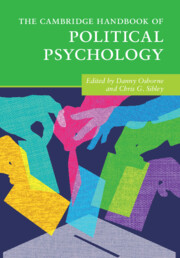Book contents
- The Cambridge Handbook of Political Psychology
- The Cambridge Handbook of Political Psychology
- Copyright page
- Dedication
- Contents
- Figures
- Tables
- Contributors
- Part I Foundations of Political Psychology
- Part II The Politics of Intergroup Attitudes
- Part III Contemporary Challenges to Democracy
- 23 The Political Psychology of Inequality
- 24 How Social Class Influences Political Choices
- 25 Fear and Loathing in American Politics
- 26 Political Extremism
- 27 The Politics of Hate
- 28 Populism
- 29 A Cultural Theory of Autocracy-vs-Democracy
- 30 Psychological Theories Meet the Challenge of Persuading and Mobilising Voters
- 31 Collective Action for Social Change
- 32 Opinion Formation and Polarisation in the News Feed Era
- 33 Conspiracy Theory Belief and Conspiratorial Thinking
- 34 Political Psychology and the Climate Crisis
- 35 The Political Psychology of Cyberterrorism
- 36 Reconciliation in the Aftermath of Collective Violence
- Part IV Diversifying Perspectives in Political Psychology
- Index
- References
29 - A Cultural Theory of Autocracy-vs-Democracy
On the Psychological Foundations of Political Regimes
from Part III - Contemporary Challenges to Democracy
Published online by Cambridge University Press: 17 February 2022
- The Cambridge Handbook of Political Psychology
- The Cambridge Handbook of Political Psychology
- Copyright page
- Dedication
- Contents
- Figures
- Tables
- Contributors
- Part I Foundations of Political Psychology
- Part II The Politics of Intergroup Attitudes
- Part III Contemporary Challenges to Democracy
- 23 The Political Psychology of Inequality
- 24 How Social Class Influences Political Choices
- 25 Fear and Loathing in American Politics
- 26 Political Extremism
- 27 The Politics of Hate
- 28 Populism
- 29 A Cultural Theory of Autocracy-vs-Democracy
- 30 Psychological Theories Meet the Challenge of Persuading and Mobilising Voters
- 31 Collective Action for Social Change
- 32 Opinion Formation and Polarisation in the News Feed Era
- 33 Conspiracy Theory Belief and Conspiratorial Thinking
- 34 Political Psychology and the Climate Crisis
- 35 The Political Psychology of Cyberterrorism
- 36 Reconciliation in the Aftermath of Collective Violence
- Part IV Diversifying Perspectives in Political Psychology
- Index
- References
Summary
Which psychological orientations form the cultural foundations of political regimes? To answer this question, I demonstrate as a point of departure that (1) the countries’ membership in culture zones explains some 70% of the global variation in autocracy-vs-democracy and (2) that this culture-bound variation has remained astoundingly constant over time – in spite of all the trending patterns in the global distribution of regime types over the last 120 years. Furthermore, the explanatory power of culture zones over autocracy-vs-democracy roots in the cultures’ differentiation on 'authoritarian-vs-emancipative values'. Against this backdrop, regime change happens as a result of glacially accruing regime-culture misfits – driven by generational value shifts into a predominantly emancipatory direction. Consequently, the backsliding of democracies into authoritarianism is limited to societies in which emancipative values remain underdeveloped. Contrary to the widely cited deconsolidation-thesis, the prevalent generational profile in people’s moral orientations exhibits an almost ubiquitous ascension of emancipative values that will lend more, not less, legitimacy to democracy in the future.
Keywords
- Type
- Chapter
- Information
- The Cambridge Handbook of Political Psychology , pp. 458 - 475Publisher: Cambridge University PressPrint publication year: 2022

